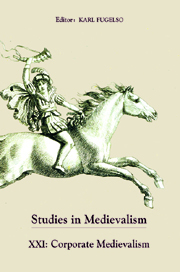Book contents
- Frontmatter
- Acknowledgments
- Contents
- Title in the Series
- Editorial Note
- I Corporate Medievalism: Some Perspective(s)
- Lives of Total Dedication? Medieval and Modern Corporate Identity
- Reincorporating the Medieval: Morality, Chivalry, and Honor in Post-Financial-Meltdown Corporate Revisionism
- Medievalism and Representations of Corporate Identity
- Knights of the Ownership Society: Economic Inequality and Medievalist Film
- A Corporate Neo-Beowulf: Ready or Not, Here We Come
- Unsettled Accounts: Corporate Culture and George R. R. Martin's Fetish Medievalism
- II Interpretations
- III Response
- Notes on Contributors
- Title in the Series
Knights of the Ownership Society: Economic Inequality and Medievalist Film
from I - Corporate Medievalism: Some Perspective(s)
Published online by Cambridge University Press: 05 February 2013
- Frontmatter
- Acknowledgments
- Contents
- Title in the Series
- Editorial Note
- I Corporate Medievalism: Some Perspective(s)
- Lives of Total Dedication? Medieval and Modern Corporate Identity
- Reincorporating the Medieval: Morality, Chivalry, and Honor in Post-Financial-Meltdown Corporate Revisionism
- Medievalism and Representations of Corporate Identity
- Knights of the Ownership Society: Economic Inequality and Medievalist Film
- A Corporate Neo-Beowulf: Ready or Not, Here We Come
- Unsettled Accounts: Corporate Culture and George R. R. Martin's Fetish Medievalism
- II Interpretations
- III Response
- Notes on Contributors
- Title in the Series
Summary
In America's ideal of freedom, citizens find the dignity and security of economic independence, instead of laboring on the edge of subsistence. […] To give every American a stake in the promise and future of our country, we will bring the highest standards to our schools, and build an ownership society. […] By making every citizen an agent of his or her own destiny, we will give our fellow Americans greater freedom from want and fear, and make our society more prosperous and just and equal.
George W. Bush, Second Inaugural Address (2005)Our journey has never been one of shortcuts or settling for less. It has not been the path for the faint-hearted, for those who prefer leisure over work, or seek only the pleasures of riches and fame. Rather, it has been the risk takers, the doers, the makers of things […] who have carried us up the long, rugged path towards prosperity and freedom. […] They saw America as bigger than the sum of our individual ambitions, greater than all the differences of birth or wealth or faction.
Barack Obama, Inaugural Address (2009)Disparate Fortunes
Although now more than ever the ideologies personified by Obama and Bush seem to stand in desperate opposition to each other, their differences are almost invisible in their respective inaugural addresses. Both speak of economic opportunity as the nation's fundamental virtue, the guarantee for a just society.
- Type
- Chapter
- Information
- Studies in Medievalism XXICorporate Medievalism, pp. 37 - 48Publisher: Boydell & BrewerPrint publication year: 2012



